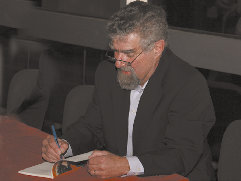Paul Magarity
Staff Writer

It was with great pleasure and interest that I attended Gregory Djanikian’s poetry reading at Fresno State, on Wednesday, March 12. The Armenian Studies Program at Fresno State sponsored the reading, in cooperation with the English Department.
Djanikian was born in Alexandria, Egypt, of Armenian parentage, and came to the United States when he was eight years old. He currently directs the creative writing program at the University of Pennsylvania.
As both a poet and an Armenian, it was an enlightening experience to observe someone who deals with Armenian issues on such a superb literary platform. Djanikian gave an incredibly moving reading from his latest book of poems, So I Will Till the Ground. Much ground is covered in his book, detailing his view of Armenian history, his experiences growing up as an Armenian in Egypt, and finally adapting to a new beginning in America.
The book bravely confronts the Armenian genocide in all its brutal honesty while also commenting on issues such as Armenian assimilation into America and societal naivete towards Armenians.
The Armenian Genocide is a topic that is so rarely addressed in society that there are surely many Americans who do not even know what an Armenian is, let alone know about the atrocities of 1915 that swallowed a whole country and forever scarred its deeply rooted heritage.
“It seems that the only discussions of the Armenian genocide are within the Armenian community. To be able to deal with such a fragile subject matter requires close care and consideration of audience,” said Djanikian.
Djanikian began his reading by stating that he intended to target non-Armenians to encompass the horrors of 1915. Exposing the horrors experienced by Armenians in 1915 is something he does almost too well. Each poem he read on the subject was totally absorbing and resonant. In his first poem, “The Aestheticians of Genocide,” he writes of Turks throwing children half-alive into a well, men bound to posts with their eye gouged out, a woman giving birth while Turkish soldiers slice her belly open, then shoving the baby back in, and the thousands of hungry deportees at the starvation camps, desperate for a piece of bread.
One line reads:
The trick is to avoid excesses
of horror so as not to scorch the mind
and strike it dumb, though grief may yowl
in the dirt and the villages burn.
Djanikian is cognizant of the fact that the Genocide is often unknown among non-Armenians, thus his next poem “History Test,” was aimed at bringing knowledge of it to a non-Armenian audience. The poem opens with the epitaph, “The Armenian genocide is the ‘forgotten genocide,’ remembered mainly by Armenians,” Leo Kuper, Genocide.
Once again drenched in detail, the poem ends:
But in 1915?
A million dead and counting
In 1915?
And no one to stop it, no one to say
This is the beginning of our century.
This was one of the most powerful lines for me because the Armenian Genocide did pave way for the horrors that would come later in the twentieth century; specifically the Jewish holocaust, where Hitler was aware of the indifference the world had shown towards the Armenians.
Poems like, “In the New Church” and “Whenever I had American Friends Over,” discuss how much of Armenian culture is sacrificed when trying to keep up appearances in a new and often alien environment. He speaks of how he was part of the only Armenian family in his community in Pennsylvania when he moved there with his family, and how difficult it was being part of the group at school, forced to go to a non-Armenian church, and making all the changes necessary to “fit in,” including changing the identity of Armenian things into American.
Overall, there is much to be learned and studied in So I Will Till the Ground. It is important to get some idea of the atrocities of 1915 so that Armenians can achieve national recognition of the Genocide, and that the world may learn from mistakes of the past. Gregory Djanikian is a genius in offering us these poems for us to interpret and feel what the Armenians felt, and the get a better understanding of what should not have happened.
 Hye Sharzhoom Armenian Action
Hye Sharzhoom Armenian Action